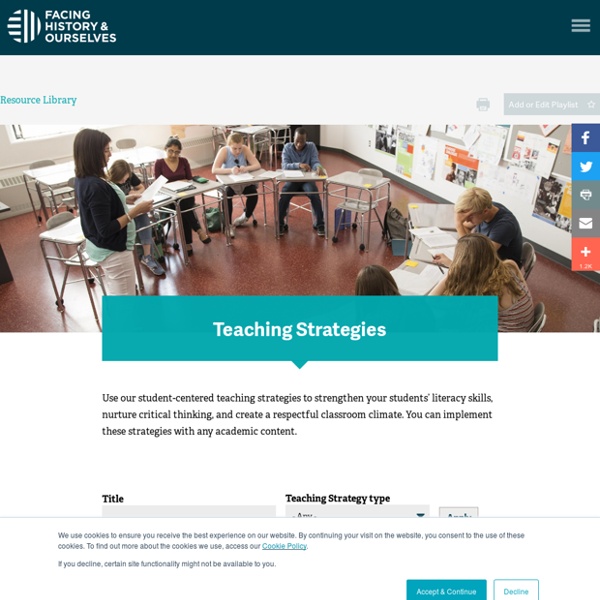



https://www.facinghistory.org/resource-library/teaching-strategies
Related: ATL • TAIS Social Studies • teacher development • High School HistoryMotivating Students Introduction Fostering student motivation is a difficult but necessary aspect of teaching that instructors must consider. Many may have led classes where students are engaged, motivated, and excited to learn, but have also led classes where students are distracted, disinterested, and reluctant to engage—and, probably, have led classes that are a mix. What factors influence students’ motivation? The history of Hong Kong, visualized PUBLISHED August 26, 2019 Home to over seven million people, Hong Kong teems with life. For weeks, it has also roiled with pro-democracy protests as millions take to the streets to demand political self-determination and personal autonomy. They’re not the first: The history of Hong Kong is one of rapid growth, political turmoil, and continual demands for change. Here are 25 powerful moments from Hong Kong’s long history: Editor's Note: This article has been updated to reflect the demands of the protesters.
Tips for Designing an Online Learning Experience Using the 5 Es Instructional Model Covid 19 has educators and educational institutions worried about and preparing for possible school closures. What happens if students have to stay home for days or even weeks? How can we keep them learning remotely? What strategies and technology tools can teachers leverage to take their traditional classes online?
Who Was La Malinche? SMITHSONIANMAG.COM | July 30, 2021, 6:30 a.m. In 1519, as Spain began brutally ravaging Mesoamerica, conquistador Hernán Cortés encountered the secret weapon who would help seal his victory: La Malinche. An enslaved Aztec girl who had been sold across the Yucatán Peninsula, Malinche was skilled at speaking both Yucatec and Nahuatl—Maya and Aztec languages, respectively. Drawing on her interpretation ability and navigation experience, she made herself essential to Cortés, providing him with access to envoys and steering his men through the unfamiliar landscape. Few historical records of Malinche’s life exist. All About Me Bags On the first day I share items that tell the class something about me. I put 5 items in a lunch bag and pull one out at a time, sharing a little bit about myself. I have a photo of my dog, a poem that I wrote, and then some other fun items. My student teacher also shared items this way.
History Assessments Beyond the Bubble unlocks the vast digital archive of the Library of Congress to create History Assessments of Thinking (HATs). Explore over 100 easy-to-use assessments that measure students' historical thinking rather than recall of facts. There are 10 “flagship” assessments, each marked with a ribbon. Flagship assessments (e.g., The First Thanksgiving) have extended features, including annotated sample student responses and “Going Deeper” videos that provide insights into the assessments and ideas for how to use them.
Mini trainings - Teach Like a Champion There are no materials available in the category. Check back soon. Cold Call has the potential to get more students doing more of the cognitive work. It's a truly powerful technique. But it's only effective if it's positive.
Yes, Critical Race Theory is compatible with Catholicism. Here’s why. Editor’s note: You cannot log on to social media or turn on cable news these days without encountering a heated debate about “critical race theory.” Is it an obscure legal concept taught exclusively to graduate students—or a dangerous worldview that is creeping into the K-12 education system? In a recent episode of the Gloria Purvis Podcast, Gloria explores those questions with Vincent Rougeau, the former dean of Boston College Law School and the first Black president of the College of the Holy Cross. They also discuss with C.R.T. is compatible with Catholicism and why Catholics approach to racial justice needs to be more sophisticated than just “love one another.” You can listen to the full episode and read an excerpt of their conversation below. The transcript has been edited for length and clarity.
Relationships Matter More Than Rules But after sharing rules and expectations, how about transitioning into sharing a few slides and artifacts that tell students about you? There’s general information you can share (details about your family, where you went to school, jobs you had before teaching, etc.), but you can add a few more vulnerable glances into your life: What struggles did you have growing up? As a student? What do you value?